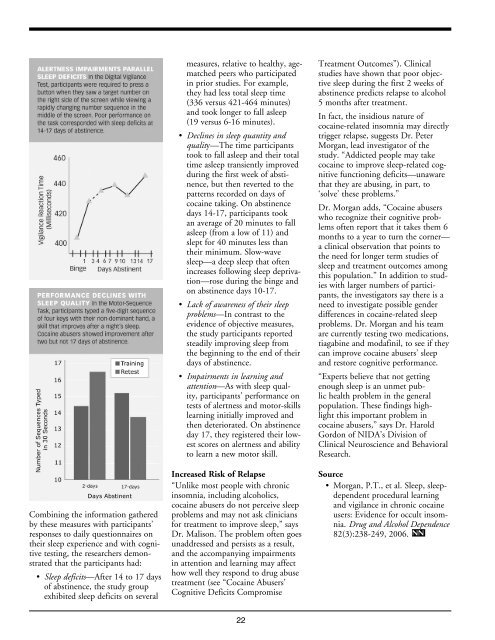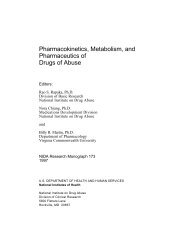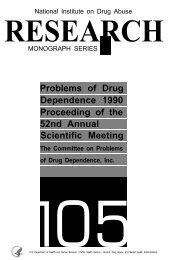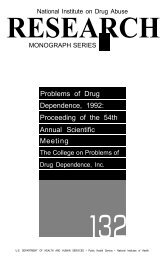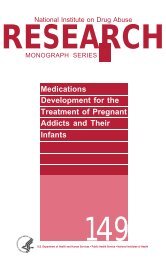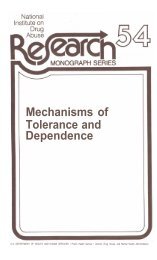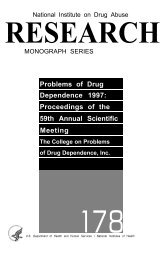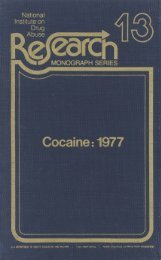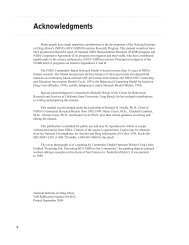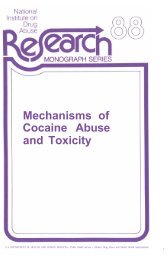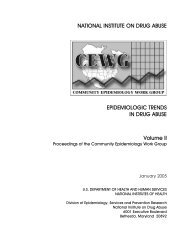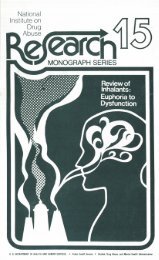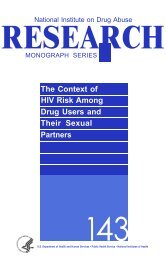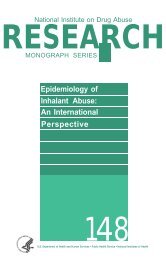Research on Cocaine - Archives - National Institute on Drug Abuse
Research on Cocaine - Archives - National Institute on Drug Abuse
Research on Cocaine - Archives - National Institute on Drug Abuse
You also want an ePaper? Increase the reach of your titles
YUMPU automatically turns print PDFs into web optimized ePapers that Google loves.
Combining the informati<strong>on</strong> gathered<br />
by these measures with participants’<br />
resp<strong>on</strong>ses to daily questi<strong>on</strong>naires <strong>on</strong><br />
their sleep experience and with cognitive<br />
testing, the researchers dem<strong>on</strong>strated<br />
that the participants had:<br />
• Sleep deficits—After 14 to 17 days<br />
of abstinence, the study group<br />
exhibited sleep deficits <strong>on</strong> several<br />
measures, relative to healthy, agematched<br />
peers who participated<br />
in prior studies. For example,<br />
they had less total sleep time<br />
(336 versus 421-464 minutes)<br />
and took l<strong>on</strong>ger to fall asleep<br />
(19 versus 6-16 minutes).<br />
• Declines in sleep quantity and<br />
quality—The time participants<br />
took to fall asleep and their total<br />
time asleep transiently improved<br />
during the first week of abstinence,<br />
but then reverted to the<br />
patterns recorded <strong>on</strong> days of<br />
cocaine taking. On abstinence<br />
days 14-17, participants took<br />
an average of 20 minutes to fall<br />
asleep (from a low of 11) and<br />
slept for 40 minutes less than<br />
their minimum. Slow-wave<br />
sleep—a deep sleep that often<br />
increases following sleep deprivati<strong>on</strong>—rose<br />
during the binge and<br />
<strong>on</strong> abstinence days 10-17.<br />
• Lack of awareness of their sleep<br />
problems—In c<strong>on</strong>trast to the<br />
evidence of objective measures,<br />
the study participants reported<br />
steadily improving sleep from<br />
the beginning to the end of their<br />
days of abstinence.<br />
• Impairments in learning and<br />
attenti<strong>on</strong>—As with sleep quality,<br />
participants’ performance <strong>on</strong><br />
tests of alertness and motor-skills<br />
learning initially improved and<br />
then deteriorated. On abstinence<br />
day 17, they registered their lowest<br />
scores <strong>on</strong> alertness and ability<br />
to learn a new motor skill.<br />
Increased Risk of Relapse<br />
“Unlike most people with chr<strong>on</strong>ic<br />
insomnia, including alcoholics,<br />
cocaine abusers do not perceive sleep<br />
problems and may not ask clinicians<br />
for treatment to improve sleep,” says<br />
Dr. Malis<strong>on</strong>. The problem often goes<br />
unaddressed and persists as a result,<br />
and the accompanying impairments<br />
in attenti<strong>on</strong> and learning may affect<br />
how well they resp<strong>on</strong>d to drug abuse<br />
treatment (see “<strong>Cocaine</strong> <strong>Abuse</strong>rs’<br />
Cognitive Deficits Compromise<br />
22<br />
Treatment Outcomes”). Clinical<br />
studies have shown that poor objective<br />
sleep during the first 2 weeks of<br />
abstinence predicts relapse to alcohol<br />
5 m<strong>on</strong>ths after treatment.<br />
In fact, the insidious nature of<br />
cocaine-related insomnia may directly<br />
trigger relapse, suggests Dr. Peter<br />
Morgan, lead investigator of the<br />
study. “Addicted people may take<br />
cocaine to improve sleep-related cognitive<br />
functi<strong>on</strong>ing deficits—unaware<br />
that they are abusing, in part, to<br />
‘solve’ these problems.”<br />
Dr. Morgan adds, “<strong>Cocaine</strong> abusers<br />
who recognize their cognitive problems<br />
often report that it takes them 6<br />
m<strong>on</strong>ths to a year to turn the corner—<br />
a clinical observati<strong>on</strong> that points to<br />
the need for l<strong>on</strong>ger term studies of<br />
sleep and treatment outcomes am<strong>on</strong>g<br />
this populati<strong>on</strong>.” In additi<strong>on</strong> to studies<br />
with larger numbers of participants,<br />
the investigators say there is a<br />
need to investigate possible gender<br />
differences in cocaine-related sleep<br />
problems. Dr. Morgan and his team<br />
are currently testing two medicati<strong>on</strong>s,<br />
tiagabine and modafinil, to see if they<br />
can improve cocaine abusers’ sleep<br />
and restore cognitive performance.<br />
“Experts believe that not getting<br />
enough sleep is an unmet public<br />
health problem in the general<br />
populati<strong>on</strong>. These findings highlight<br />
this important problem in<br />
cocaine abusers,” says Dr. Harold<br />
Gord<strong>on</strong> of NIDA’s Divisi<strong>on</strong> of<br />
Clinical Neuroscience and Behavioral<br />
<str<strong>on</strong>g>Research</str<strong>on</strong>g>.<br />
Source<br />
• Morgan, P.T., et al. Sleep, sleepdependent<br />
procedural learning<br />
and vigilance in chr<strong>on</strong>ic cocaine<br />
users: Evidence for occult insomnia.<br />
<strong>Drug</strong> and Alcohol Dependence<br />
82(3):238-249, 2006.


